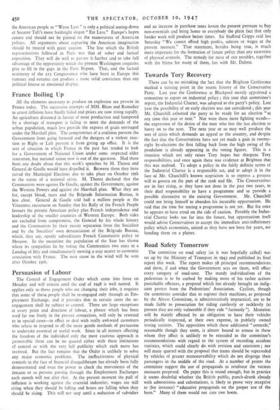Persuasion of Labour
The Control of Engagement Order which came into force on Monday and will remain until the end of 1948 is well named. It applies only to those people who are changing their jobs, it requires that some of thestt people shall be re-engaged only through an Em- ployment Exchange, and it provides that in certain cases the re- engagement shall be subject to control. There are large exceptions at every point and direction of labour, a phrase which has been used far too freely in the present connection, will only be resorted to in special cases—in effect to deal with really awkward customers who refuse to respond to all the more gentle methods of persuasion to undertake essential or useful work. Since in all matters affecting the freedom of the individual only the most cautious approach is permissible there can be no quarrel either with these limitations of control or with the very full publicity which each move has received. But the fact remains that the Order is unlikely to solve any major economic problems. The ineffectiveness of physical controls in the face of financial disequilibrium has already been fully demonstrated and even the power to check the movements of the 200,000 or so persons passing through the Employment Exchanges each month will not alter that. At the present moment the pull of inflation is working against the essential industries, wages are still rising when they should be falling and hours are falling when they should be rising. This will not stop until a reduction of subsidies and an increase in purchase taxes lessen the present pressure to buy non-essentials and bring home to everybody the plain fact that only harder work will produce better times. Sir Stafford Cripps said last Saturday "We cannot afford high profits, salaries or wages at the present moment." That statement, besides being true, is much more important for the formation of future policy than any extension of physical controls. The remedy for most of our troubles, together with the blame for many of them, lies with Mr. Dalton.


































 Previous page
Previous page